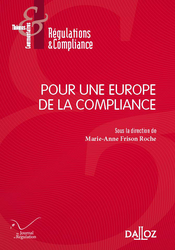
March 22, 2020
Publications

This working paper is the basis for an article in the French Law Journal Le Clunet.
When we compare the terms "Compliance" and "Extraterritoriality", it is often with dissatisfaction, even anger and indignation. On the momentum, after having expressed a principle of disapproval of such a merger, attention is focused on how we can fight against it, to break the link between Compliance and Extraterritoriality. But do we have to go so fast? Is this negative initial assessment correct?
Indeed, thus gone, it is frequently explained that the binding mechanisms of Compliance are suffered, that they come from abroad!footnote-1750, that they apply with efficiency but in an illegitimate way, without agreement of the one who must submit to it, whose resistance is therefore certainly ineffective but nevertheless justified. In the same spirit, when we start to shell the cases, like so many scars, sort of rosary, even crown of thorns, BNPP case!footnote-1718, Astom case!footnote-1717, etc., the wounds not yet closed turn into reproaches made against the rules, public authorities, even reproaches made against named people.
We are leaving this kind of complaint against X, which targets what would be this appalling "Compliance", this Law which would be both hostile and mechanical which would not have been able to stay within the limits of borders, Compliance being thus placed in contrast to sovereignty and protection, which presuppose staying within its limits!footnote-1716 and being able to protect companies from abroad. More concretely, this presentation targets more directly the United States, which uses "the legal weapon", slipped under what is then designated as "the artifice of the Law" with extraterritorial scope. But this effect would in reality be the very object of the whole: their hegemonic will to better organize at least a global racket, notably through the Foreign Corrupt Practices Act (FCPA) and at best a world government through notably the embargoes.Those who believed otherwise would be naive or foolish. This silences the opponents because who likes this costume? So the world would be put in a ruled cut; what the mafia could not have done, Compliance Law would have obtained, offering the whole world to the United States thanks to the extraterritoriality of its national Law.
Compliance Law would thus become the very negation of Law, since it has the effect, even the purpose (barely concealed by strategic, powerful and shameless States), of counting borders for nothing, whereas Public International Law, in that it is built between the sovereign subjects of law that are the States presupposes the primary respect for borders to better exceed them while Private International Law takes the same postulate to better welcome foreign Law in situations presenting a foreign element!footnote-1726. Jurists believed in the force of Law; by Compliance, we would return to the sad reality that only the powerful, here the United States, dominate and - ironically - it is under the pretext of Law that they do it. It would be necessary to be well duped, or accomplice, to see there still legal where there is only the balance of powers. When one is more intelligent or skilful than that, one understands that the "small" can only be "subject" to the Compliance Law, one would have to be powerful to be the normative source and its enforcement agent. It is then towards this mis-named Department of Justice (DoJ) that the fearful, hateful and resigned glances turn.
If you see it that way, what should you do then? The answer is obvious: react!
It is necessary to save the sovereignty, France, companies, the Law itself. If that is how the question is posed, how can we disagree? It is therefore necessary to destroy the Compliance Law and the extra-territoriality of American Law which had found this "Trojan horse", an expression so frequently used. This is the basis for the administrative reports available, for example the Berger-Lellouche!footnote-1719 parliamentary reports and the Gauvainfootnote-1720 report. Both of them broadly develop the two preceding claims, namely that the extra-priority of compliance mechanisms is illegitimate and harmful, since it is a mechanism invented by the Americans and harming the Europeans, or even invented by the Americans to harm Europeans, the description being made in much more violent terms than those used here. The description seems acquired, the reflections therefore relate to the remedies. The reaction is most often to "block" the Compliance Law in its extraterritorial effect.
But without discussing the effectiveness of the remedies proposed downstream, it is necessary to return to this description so widely shared made upstream. Because many elements on the contrary lead to affirm that ComplianceLaw first of all and by nature can only be extraterritorial and that it must be. Whether or not the State in which it was created has malicious intentions. The description which is made to us most often describes particular cases from which we draw generalities, but we cannot reduce Compliance Law to the already cooled cases, as BNPP case, or to the always hot case of the American embargo on Iran. Furthermore, one cannot take the issue of embargoes and draw conclusions, legitimate for it, but which would apply to the whole of Compliance Law. The fact that theCompliance Law is a branch of Law at the stage still of emergence can lead to this confusion which consists in taking the part for the whole, but it is very regrettable because what is justified for the embargoes does not is in no way relevant for all Compliance Law, of which precisely the Law of embargoes is only a small part, even an abusive use. This overlapping is not often perceived, because the definition of Compliance Law and its criterion are not clearly enough defined, namely the existence of a "monumental goal"!footnote-1725, which does not exist in an embargo decided unilaterally by an order decreed by the President of the United States, but which exists in all other cases and fully justifies extraterritoriality, extraterritoriality which is even consubstantial with Compliance Law (I).
Once we have distinguished the embargoes, as an atypical, sometimes even illegitimate part, of Compliance Law, we should continue this work of distinction by emphasizing that the United States has certainly invented Compliance Law!footnote-1721 but only developed a mechanical concept for the prevention and management of systemic risks. Europe has taken up this systemic conception of the protection of systems, for example financial or banking, but superimposed another conception, drawing on its deep humanist tradition!footnote-1722, whose protection of personal data is only an example and whose monumental goal is the protection of the human being. This primary concern then justifies the European use of Compliance mechanisms to interfere with global objects regardless of their location, especially the environment, and to block the entry onto the ground of objects that enter, which is contrary to Competition Law but builds a legitimate barrier under this Compliance Law, in the indifference of an extraterritorial origin (II).
Indeed, this branch of the new Law which is Compliance Law is not reducible to Competition Law!footnote-1723, any more than it is not reducible to a method. It is a substantial, extraterritorial Law because the "monumental goals" which give it substantial unity are extraterritorial. This can directly contribute to the future of a Europe which on the one hand will be able to pursue, in an extraterritorial manner, monumental humanist goals, in the field of the environment or the protection of personal information or access to the Law (in particular by the technique of compliance programs) and which, on the other hand, by the techniques of traceability of products!footnote-1724, will have the means not to bring in products manufactured in an indecent manner, except in countries which do not grant value than in Competition Law to enter the WTO.
Read the developments below.

Updated: Sept. 24, 2019 (Initial publication: Aug. 31, 2019)
Publications

Summary : In August 2019, about the fire devastating the Amazon, the French Minister of Ecology says that this fact "is not just the business of a state" (n'est pas que l'affaire d'un Etat). This assertion denies the postulates of Public International Iaw (I). This supposes a new system, based on the idea that the power of the State on its territory is erased when the object that is there is no longer related to this "part" but to the All that is Universe (II). Let's accept the augur. First question: if it is not only the case of a State, whose business is it? (III). Second question: to anticipate the other cases that fall under this regime, what should be the criteria in the name of which the All will have to prevail over the part and who will then take care of the case of which the "local" State is divested? (IV). Because the perspective goes beyond the environment, beyond Brazil, beyond the States. It leads to Compliance Law animated by "monumental goals" that are the concern for the Universe and humans, in a humanist spirit. Let's go.
___
On August 27, 2019, on the French radio France Inter, Elisabeth Borne, French Minister of Ecology (Transition écologique) expresses it clearly: "Quand on est sur un enjeu tel que l'Amazonie, ça n'est pas que l'affaire d'un État", that can be translated : "When we are on a stake such as the Amazon, it is not only the business of one State ".
Starting from one case, "the Amazon", the Minister, thus taking up the position of the French President, associates a general consequence: "it is not only the affair of one State".
This is not a trivial sentence.
This affirmation denies, and why not, the entire system of Public International Law (I). By a new reasoning based on the idea that the All prevails, as by an effect of nature, on the Part (II).
Admitting this, it leads to opening two sets of questions. The first is related to the following main question: if it is not only the case of one State, of which is this the concern (III)? The second set of questions revolves around the questioning of the criteria on behalf of which other cases must be seized in the name of "All " and how to do it (IV).
A. The postulate of Public (and Private) International Law: parties (States) which, because of common interests, are in contact
The notion of State includes in its very definition the notion of territory (a territory, a population, institutions).
Thus the State governs through its institutions what is happening on its territory. For example, if there is a fire, or a risk of fire, the State makes arrangements through all legal, financial, technical and human instruments available to it. It is accountable for what it does through its political and legal responsibility.
When what is happening on its territory exceeds this one, in fact (epidemic, catastrophe with the consequences exceeding the borders, migrations, etc.) either according to its own opinion or according to that of the other States, the States, being sovereign subjects of Law in the international system, act together on a pre-built legal basis: bilateral or/and multilateral treaties!footnote-1675, having created legal integrated zones (like the European Union or the United States) or international institutions (like the IMF).
A particular technique has been developed for several millennia - but here again the seniority is not sufficient to keep the system: diplomacy, anchored in each state in a particular ministry: the Ministry of Foreign Affairs, which each national government has. If one State totally excludes one phenomenon in the territory of another, the progressive procedure of ceasing diplomatic ties begins.
This can result in wars.
In the "case of the Amazon" both the President of Brazil and the President of the United States stick to the classical construction of Law.
Indeed, the former asserted that the Amazon is in the territory of Brazil, thus falls under the jurisdiction of the power of the Brazilian State and the Brazilian Law, from which it follows that another State does not have to come to interfere. However, the French President takes the floor not as this forest extends also on a French territory but as it is the business of the World. On the contrary, the President of Brazil claims the closing effect, which excludes a third State from taking over directly something - even a difficulty - that takes place in the territory of another.
The President of the US federal State has said that these are joint decisions between the President of Brazil and other heads of State, sovereign subjects of Law, who must agree to organize a solution to solve a local problem . Because in the same way that States can declare war, they can help each other!footnote-1676.
The whole Public (and Private) International Law is therefore based on this assumption: "parts" of the world, on which sovereign parties (States) have taken contact, because circumstances make something that falls within one of them or several others.
This is precisely what is called into question. The notion of the "right of interference", whose evocation we hardly hear any more, had already done so. But on another basis.
B. The "right of interference": idea that somebody can directly interfere with what happens in a country , an idea that does not question the postulate of the International Maw, an idea that rests on something else: a " right for the other "
The "right of interference" is the idea that in certain territories, things happen that are inadmissible.
In memory of the jus cogens, a kind of "Natural Law" of Public International Law, Another, that could be another state, can come to meddle with what is happening in a territory that is closed, without declaring war. to the state that keeps its borders.
It is the need of others, for example those who die in mass on this territory, or the nature that is devastated in the indifference of the State on whose soil the disaster is happening, which founds this "right" of another state to come and take charge.
The foundation of this "right" is therefore a "duty".
C. The new idea: a territory is only part of the Globe, whose fate is everyone's concern
The idea is new because it is not based on altruism. And no more about self-interest. Yet, de facto and de jure , the Amazon is not on the sole territory of Brazil.
France is particularly well placed to say something about it since part of the Amazon is on French territory.
Thus the inaction of the main concerned Brazil directly affects the interest of France, a "forest" being a block that can not be divided. If we were in Property Law, we would say that we are in indivision with Brazil and that in this respect, with the other States on whose territories this forest extends, a solution must be found.
Because of the indivisibility of this particular object which is this particular fores!footnote-1644, it is necessary that the States whose territory is concerned have a say in the matter.
But this is not the argument put forward by France, particularly by the President of the Republic.
It is said that the whole world is concerned about the fate of the Amazon. It could be said that, in this respect, when what could be described as a "global forest" is well treated, its management does indeed fall within the power of Brazil, Brazilian companies and the Brazilian State, but when it is abused to the point of seeing its future compromised, when fires may make it disappear, then this forest appears not to be localized in Brazil but being located in the World, of which Brazil is only a part!footnote-1648.
This reasoning, which then gives voice to everyone, for in the world every state is included in it, is a new reasoning.
The economic-political theory of the "commons" does not account for it because it is not a very legal theory!footnote-1656.
II. THE NEW REASONING THAT COVERS THE CLASSIC REASONING OF PUBLIC INTERNATIONAL LAW
The new reasoning adopted by the Minister consists in saying that the Amazon does not concern only Brazil. This forest should therefore be directly related to the World (A). This is a welcome change in the system but based on a paradox (B).
A. When the Amazon is in danger of death, then it should no longer be attached to this part of the World that is Brazil, but directly to the World
This forest is presented as the "lung" of the planet, it is the "future" of humanity. In this, it can concern only one State, not even the one on whose territory this "Humanity good" is located!footnote-1643.
As such, without the need to declare war to Brazil, another State may speak, for example the French State through the one that represents it in the international order, that is to say its President, to say what to do, since according to him the President of Brazil does not say or do what it is absolutely necessary to do for the whole planet and for the future of Humanity.
This induces a complete renewal of international institutions.
Indeed a direct attachment to the World and no longer to Brazil gives the forest object a special status because of a goal that exceeds Brazil: save the Amazon would impose because it would save the world. Therefore, it can no longer be the subject of Brazil, which would be like "dispossessed" by a goal that is imposed on it: to save the Amazon rainforest, even though it is mainly on its territory, while other States become legitimate to dispose of this object, even if the forest would not be in part in their territory, even if they would not be affected in their own interests.
This contradicts all Public International Law!footnote-1645; because the agreement of the political representatives of Brazil is no longer required and no one yet evokes the need to declare war to Brazil, and fortunately!
Such an upheaval justifies that such an affirmation is accepted with difficulty. One understands better than first consequence, which is not so innocuous, one of the first rules of diplomacy which is the politeness, between the heads of state, with regard to the spouses of these , have be broken!footnote-1657, that the remarks have slipped on personal questions, etc.
B. A welcome but paradoxical change in the system
Why not change the system?
This is difficult to admit, not only because it is brutal, but because it is paradoxical.
The paradox is the following. It is recognized that the theme of the disappearance of borders by "globalization"!footnote-1647 no longer reproduces the reality of facts!footnote-1646, especially not the Chinese situation, the digitalization having on the contrary allowed the construction of even stronger boundaries. What we called "globalization" now belongs to the pastWhat we called "globalization" now belongs to the past!footnote-1660. So today we should recognize on one side the reality of borders - which had not disappeared or are reborn - but only to better step over them, since - based on the concern of the world - states, yet each in their borders, would be legitimate to go directly to intervene in the business of others.
The paradox is therefore, on the one hand, the rejection of the allegation of a de facto disappearance of borders by an economic interdependence, technology having denied "globalization" as a fact !footnote-1649 and the linked resurgence of borders allowing States to affirm more than ever that they would be "sovereign masters at home", which should logically lead to let Brazil decide for the Amazon, while yet on the other side we witness the questioning of the postulate of Public International Law as recognition of sovereignty and construction from agreements between states, requiring the agreement of the state whose territory is concerned (except war), questioning which leads to allow all to meddle with the fate of the Amazon, as if there was no border.
This paradox leads to two questions.
The first question is: if "it's not juste one State affair", who's concerned?
The second question is: after the "case of the Amazon", what are the other cases? And how are we going to provide solutions, if we no longer have the solutions of Public International Law, that is to say, the agreement of the country whose territory is concerned and which we do not want not go to war?
If we have clear ideas on the answers to be given to these two sets of questions, then because indeed when the future of all is in progress it can not be the affair of a single State, it is necessary to question Public International Law. But do we have clear ideas on these two questions? And what are the possibilities for possible solutions?
See the text following below.
May 29, 2019
Publications

♾️ follow Marie-Anne Frison-Roche on LinkedIn
♾️ subscribe to the Newsletter MAFR Regulation, Compliance, Law
____
► Full Reference: M.-A. Frison-Roche (ed.), Pour une Europe de la Compliance (For the Europe of the Compliance), series "Régulations & Compliance", Dalloz, 2019, 124 p.
____
This volume is the continuation of the books dedicated to Compliance in this collection.
📚Read the other books' presentations of the collection about Compliance:
🕴️M.-A. Frison-Roche (ed.), 📕La juridictionnalisation de la Compliance, 2023
🕴️M.-A. Frison-Roche (ed.), 📕Les Buts Monumentaux de la Compliance, 2022
🕴️M.-A. Frison-Roche (ed.), 📕Les outils de la Compliance, 2021
🕴️N. Borga, 🕴️J.-Cl. Marin &🕴️J.-Ch. Roda (ed.), 📕Compliance : l'Entreprise, le Régulateur et le Juge, 2018
🕴️M.-A. Frison-Roche (ed.), 📕Régulation, Supervision, Compliance, 2017
🕴️M.-A. Frison-Roche (ed.),📕 Internet, espace d'interrégulation, 2016
📚Read the presentations of the other titles of the collection.
____
► General presentation of the book: This book is written in French. The topic is : "For the Europe of the Compliance".
See below its general presentation in English.
The political dimension is intrinsic to the Compliance Law. Indeed, compliance mechanisms consist of internalizing in certains companies the obligation to implement goals of general interest set by Public Authorities. These public bodies control the Ex Ante reorganization that implies for these companies and punish Ex Post the possible structural inadequacy of these compagnies, becoming transparent for this purpose.
This new mode of governance establishes a continuum between Regulation, Supervision, Compliance (book published in 2017) and renew the links between Companies, Regulators and Judges
This political dimension must be increased: the Compliance Law of Compliance must today be used to build Europe.
One can observe not only the construction of the European Compliance Law, object-by-object, sector-by-sector, purpose-by-purpose, but also the construction of the European Compliance Law that transcends and unifies them. Becoming independent of American Law and ceasing to be in reaction, even on the defensive, the Compliance Law contributes to the European project, offering it a higher ambition, that Europe can carry and, by this way, can carry the Europe itself, not only to preserve the European economy from corruption or money laundering, but by claiming the protection of nature and human beings.
This is why the book describes the "reasons and objectives" of the Europe of the Compliance, which makes it possible to describe, detect and even predict the ways and means.
____
► Understand the book through the Table of Contents and the summaries of each article:
🕴️M.-A. Frison-Roche, 📝Avant propos
🕴️K. Lenaerts, 📝Le juge de l'Union européenne dans une Europe de la compliance
🕴️M.-A. Frison-Roche, 📝Un droit substantiel de la compliance, appuyé sur la tradition européenne humaniste
I. LES RAISONS ET LES OBJECTIFS D'UNE EUROPE DE LA COMPLIANCE (THE REASONS AND OBJECTIVES OF THE EUROPE OF THE COMPLIANCE)
🕴️X. Musca, 📝Construire une Europe de la compliance en donnant une meilleure place aux entreprises
🕴️P. Vimont, 📝La place de la diplomatie dans l'avancée d'une Europe de la compliance
🕴️P. Sellal, 📝Les vertus de la compliance : une réponse possible aux faiblesses de l'Union européenne ?
🕴️J.-J. Daigre, 📝Compliance, entreprise et Europe
II. LES VOIES ET MOYENS D'UNE EUROPE DE LA COMPLIANCE (THE WAYS AND MEANS OF THE EUROPE OF THE COMPLIANCE)
🕴️J.-Cl. Marin, 📝Quels outils pour la construction du droit de la compliance en Europe ?
🕴️M. Canto-Sperber, 📝La compliance et les définitions traditionnelles de la vertu
🕴️T. Bonneau, 📝Compliance et secteur bancaire et financier en Europe
🕴️C. Duchaine, 📝L'Agence française anticorruption, à l'appui de l'Europe de la compliance
🕴️D. Martin, 📝Les contraintes et les vertus de la compliance
🕴️A. de La Cotardière, 📝Construire une Europe de la compliance lisible pour les entreprises
________
Frison-Roche, M.-A., Compliance, see
July 3, 2018
Publications

► Full Reference: Frison-Roche, M.-A., Dessiner les cercles du Droit de la Compliance, in Études en l'honneur de Philippe Neau-Leduc, Le juriste dans la cité, coll. « Les mélanges », LGDJ-Lextenso, 2018, pp. 483-496.
____
🚧this article is based on a Working Paper, with footnotes, technical references and hypertext links.
This Working Paper is freely available :
- in French: Tracer les cercles du Droit de la Compliance.
- in English: Drawing the circles of Compliance Law.
____
► English Summary of this article: Compliance Law has the same teleological functioning as the Economic Law to which it belongs, which consists in placing the normativity of rules, decisions and reasoning in the aims pursued. Once we know what the goals of compliance techniques are, then we know who should be responsible for them, who must be subject to them, who must activate the rules: compliance rules must be activated by those who are in the best position to achieve the outcome in order to achieve the goal sought by the authority which designed the compliance mechanism. The "circles" are thus plotted in a rational and pragmatic way. That, all of it ("useful effect"), but not beyond that. The notion of efficiency does not always imply balancing: on the contrary, it can involve drawing circles which designate those who are "placed" to carry the burden of the rules because they are capable of producing them the desired effects. Within these circles, the rules must apply without restriction and without compromise, but they must not apply beyond these circles.
Drawing such circles requires defining the Law of Compliance itself, since on the one hand the choice of those who must implement the Compliance depends on the aims of the Compliance and on the other hand the definition of the Law of Compliance is itself teleological in nature. This is why, contrary to the assertion that the exercise of definition would be useless in these matters, which would be above all on a case-by-case basis, this effort to define and determine the purposes is, on the contrary, necessary in practice to show which enterprise must bear the obligations of compliance and which must not.
But it is enough to have posed this to reveal the major difficulty of the Compliance, that explains resistances, and even gives the impression that one is confronted with an aporia. If, as a matter of principle, what is expected of the "users" of the Compliance mechanisms must be articulated to the aim that is affected by the authors of the compliance mechanisms to them, we must have a minimum correspondence between the aims of these authors (Legislators and Regulators) and the aims pursued by those who are responsible for implementing them: companies. However, this correspondence does not exist at first sight, because the compliance mechanisms are found to be uniquely based on "monumental goals" which the public authorities have a legitimate concern, whereas companies have for their own interest . The two circles do not match. The internationalization of concern for these aims in companies would therefore be only a mechanism of violence of which enterprises are the object, violence felt as such. (I).
To resolve this violence, it is better to stop confusing the State and enterprises, whose goals are not the same, and draw the circle of subjects of law "eligible" for Compliance. It is highly legitimate to target certain entities, in particular this category of companies, which are the "crucial operators", in a binding way, as it is legitimate to govern companies that have expressed a desire to surpass their own interests. These circles of a different nature can overlap on a concrete operator: for example, if a bank - always a crucial operator that is structural because it is systemic - is also international - a crucial operator because of its activity - decides to worry about others by commitments verified by the authorities to overcome their own interest (social responsibility), but these different circles are not confused. In any case, companies may belong to only one circle, or even belong to none. In the latter case, they must therefore remain beyond the reach of the pressure and cost of Compliance Law, in particular because they are not objectively required to realize the "monumental goals" aimed at effectiveness and do not want it: in a liberal system, it is for the public authorities to aim at the general interest, the ordinary people indirectly participating in it by paying the tax. (II).
It is by making these "Compliance Circles" of eligible subjects of this specific Law to implement the heavy but justified and controlled burden of Compliance with regard to the monumental goals that this new system aims, that then opens a royal way in order to find a uniqueness and to increase the "monumental function" of the Compliance Law by a relation of Trust towards the global general interest, rather than the mechanical application of rules whose meaning is not understood and whose perception is no longer perceived than violence.
____
________

Dec. 12, 2017
Publications

Pour lire la version française de ce working paper, cliquer sur le drapeau français.
This working paper serves as a support for the article to be published in the book written in French, Ingall-Montagnier, Ph., Marin, J.-Cl., Roda, J.-Ch. (dir.), Compliance : l'entreprise,le régulateur et le juges, in the Serie Regulations, co-edited by Éditions Dalloz and the Journal of Regulation and Compliance (JoRC).
This work uses by links the Compliance and Regulation Law bilingual Dictionnary.
____
Summary. We have to admit it. Because in front of so numerous and so disparate Compliance rules we pain so much to figure out, we are constraint to go in so changing directions, that we console ourselves with their weight, their cost and our misunderstanding by affirming that Compliance is "complex" and "transdisciplinary", as if complicated words could mask our disarray. But "Compliance" is not a cataclysm, a bomb sent by the Americans to annihilate Europe, the new form of a Cold War in legal dress, it is a way of seeing things that comes from afar, with its own coherence and which must first be understood.
If one understands where this new corpus comes from, which now obliges companies to prove that they effectively take on the fulfillment of certain goals that go beyond them, notably the fight against money laundering, tax evasion, but also the fight against the sale of human beings or the struggle for the preservation of nature and Earth, then we can continue the story.
Indeed, not all companies are targeted by such internalization of "monumental goals" within them." An ordinary firm is destined to develop itself in order to achieve a goal which is its own. The concern of these goals can only be for the "crucial firm. "If there is to be a change in the corporate project, then it can only depend on its" position "in a system, a financial, economic, social, global system, or because it has itself decided that it would be so. The company then bears the burden of proof that such a discourse of new responsibility corresponds to a behavior and an effective culture. The weight of the rules already exists today. And it is for the moment that now, in a negative and passive way, Compliance is perceived, by those who "undergo" it (companies), even by those who apply it (public authorities).
The transformation towards a "culture of trust" is the issue between today and tomorrow, because tomorrow, it is a relationship of trust that could be built between these companies and the public authorities, because they would share information (systemic issue), because they would agree on the less technical monumental goals (protection of human beings issue).
In this perspective, "Compliance" is above all a bet, that of the place of human beings in globalized markets.
June 2, 2017
Conferences

Reférence complète : Frison-Roche, M.-A., Les fonctions de la Compliance. Un choix politique à faire ("The functions of Compliance. A political choice to do"), in Borga, N. et Roda, J.-Ch. (dir.), La compliance : nouveaux enjeux pour les entreprises, nouveaux rôles pour les juristes ? ("Compliance: new challenges for companies, new roles for lawyers?"), Centre du Droit de l'entreprise Louis Josserand, Université Lyon IIII Jean Moulin, France, Lyon, 2 juin 2017.
Summary of the conference :
Compliance mechanisms are being constituted in "Compliance Law", new branch of Economic Law. Its functions are determined by the goals. But the goals are "monumental", since it is nothing less than the end of corruption, trading in influence, arms trafficking, international terrorism, trafficking in human beings, selling of human organs, the effective safeguard of environmental protection, safeguarding the planet, access to culture for all, preservation of civilization, the effectiveness of human rights ...
The goals of a company are not a priori of this order, even if every firm understands that it is clever to appear amiable.
By comparing the two types of goals, a difference of nature is measured.
By the Compliance Law, companies are therefore invited to "get out of themselves.
Consequently, the functions that shape the contours of Compliance Law transform those who are the "subjects of law", the enterprises: these are the subjects, insofar as they are agents of legality. But this can not be the case for all companies.
If the effect of Compliance were to be generalized to all companies, this would be catastrophic and would make no sense.
However, who firmly and precisely drew the circle of "legal subjects eligible to be the legality agent" of Compliance? With the considerable costs and responsibilities that go with it?
If it has not been the Legislator, it will have to be the Judge. Because the judge is guardian of the spirit of Law and guardian of legal orders. Especially if it is a global legal order.
___
Moreover, companies are not only passive subjects of Compliance Law - which would be the case of a misunderstood Compliance Law - but are also active subjects of Compliance Law. Indeed, these "monumental goals" which draw the functions of the Compliance are exactly the same as those of the Corporate Social Responsibility.
Thus, if the Compliance is conceived of only as an immense and empty submission of all undertakings to total regulation, the result will be an opposition between the regulatory power and the will of undertakings, a concrete opposition between public authorities and companies. If, on the other hand, we conceive Compliance Law as that by which "crucial enterprises" like the Regulators are moving towards the realization of "monumental goals, then Compliance Law crystallizes a" Trust Pact""between the two, Which goes beyond the borders and becomes a means of regulating globalization.
This second conception is the future of European Law.
____
See the slides (in French).
Read the working paper on which the conference is based (working paper in English)